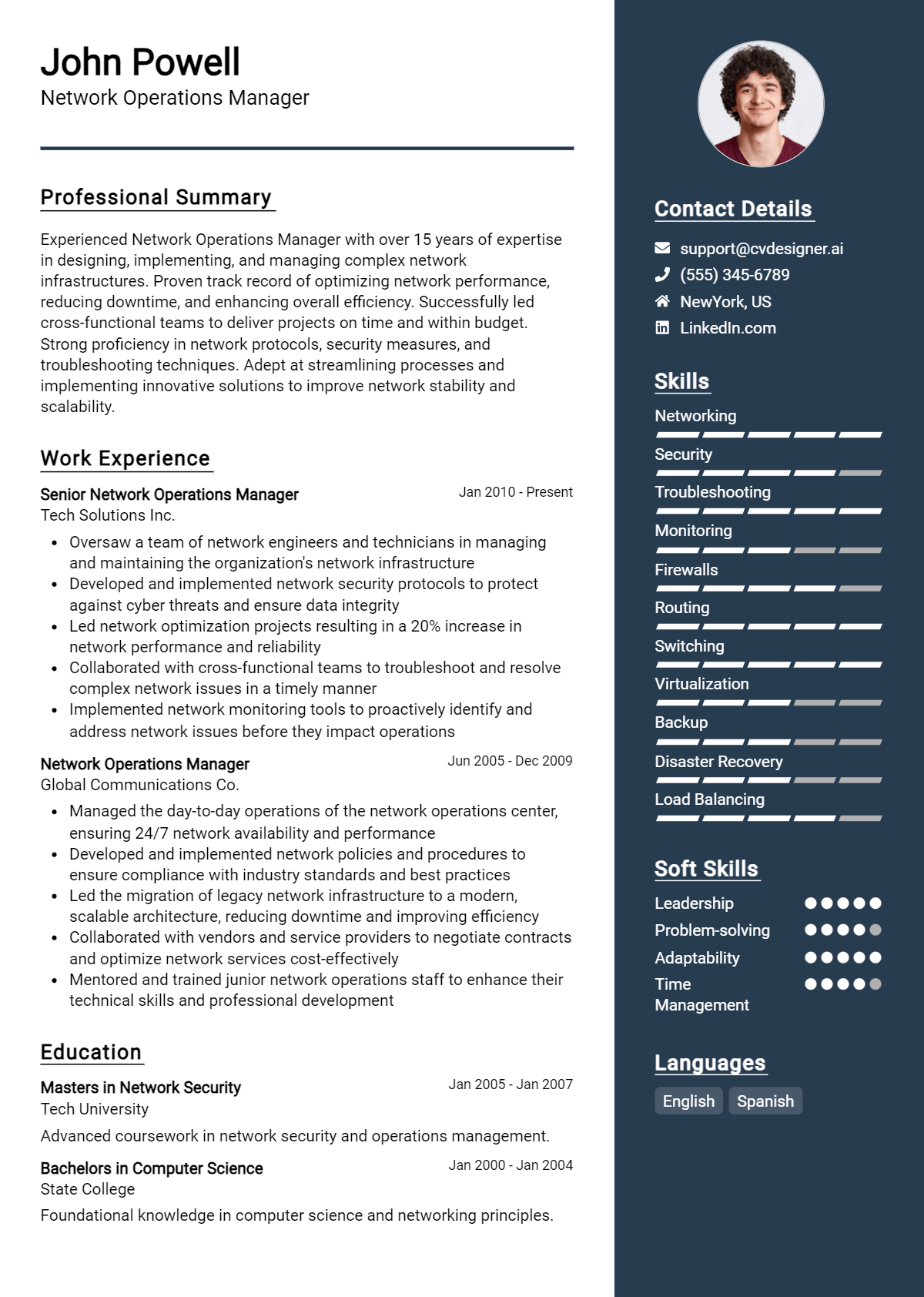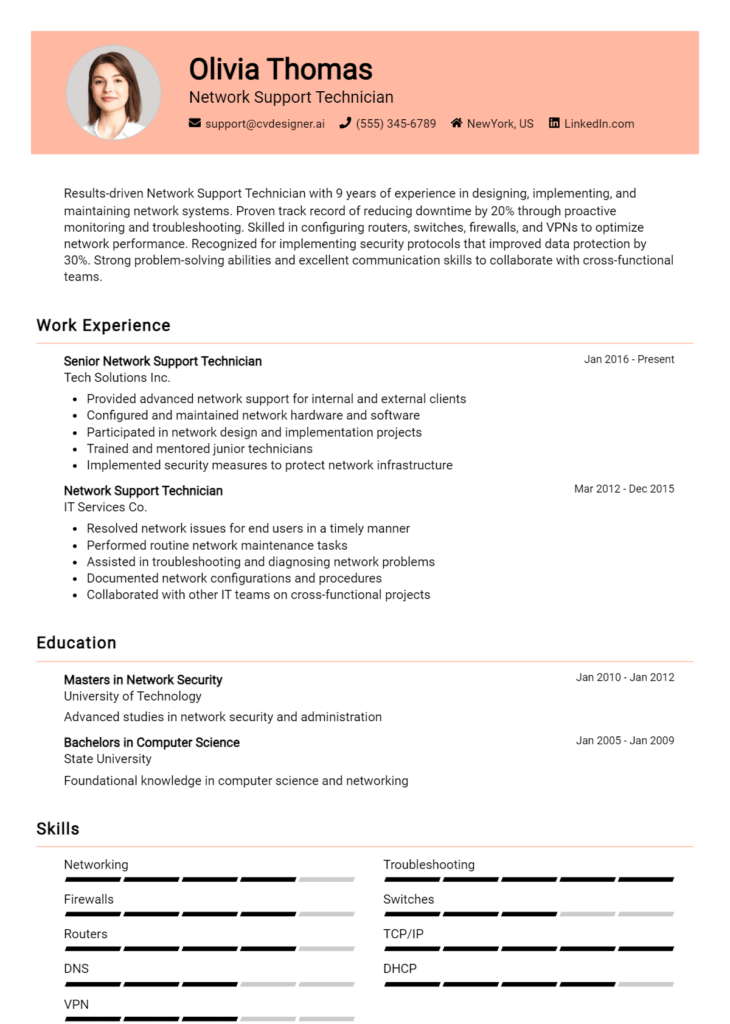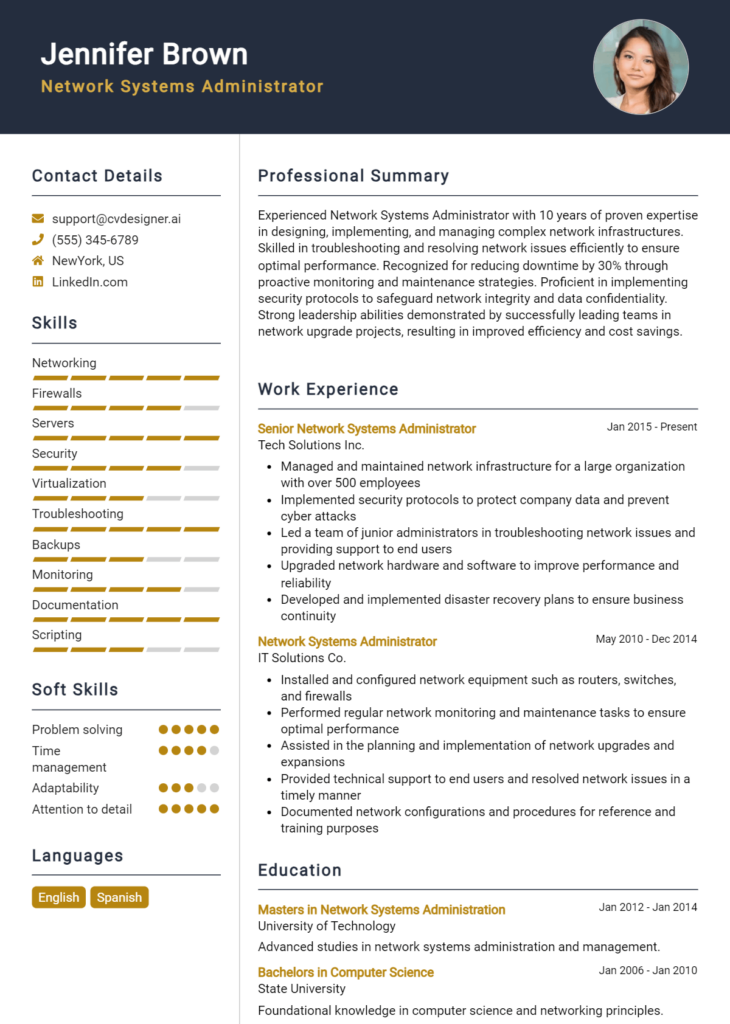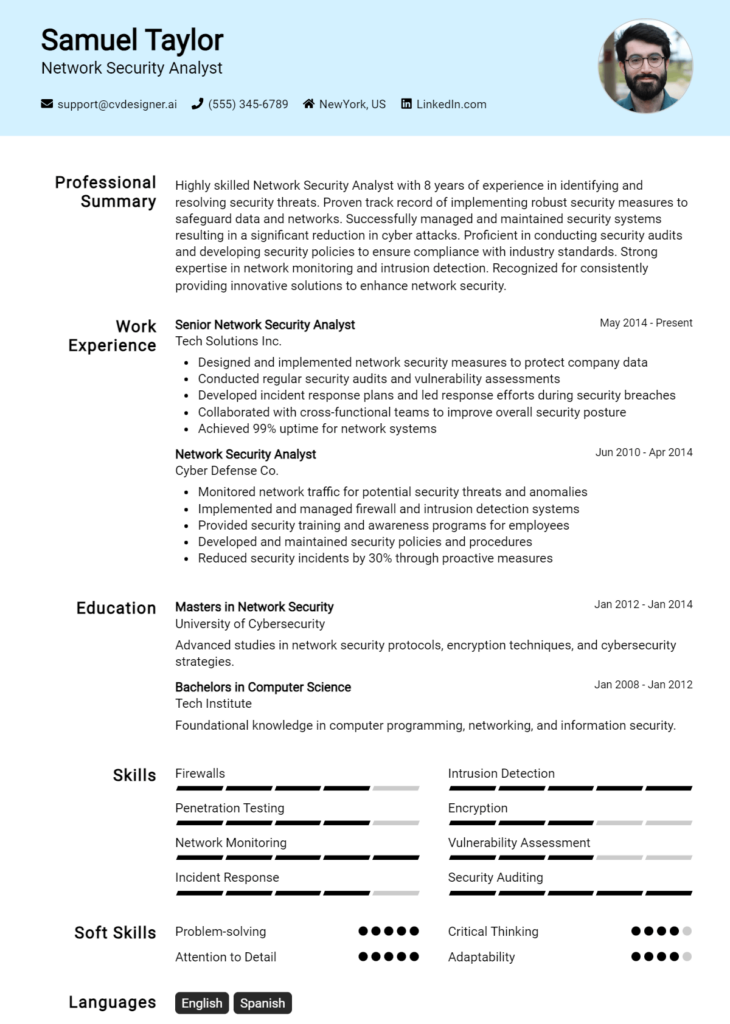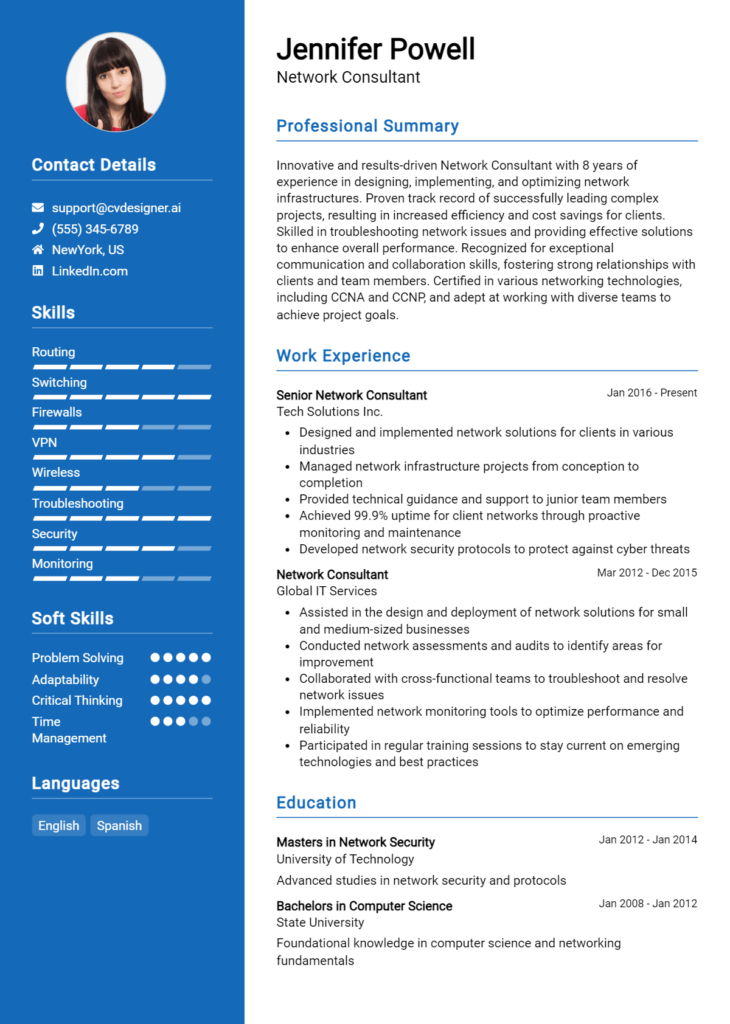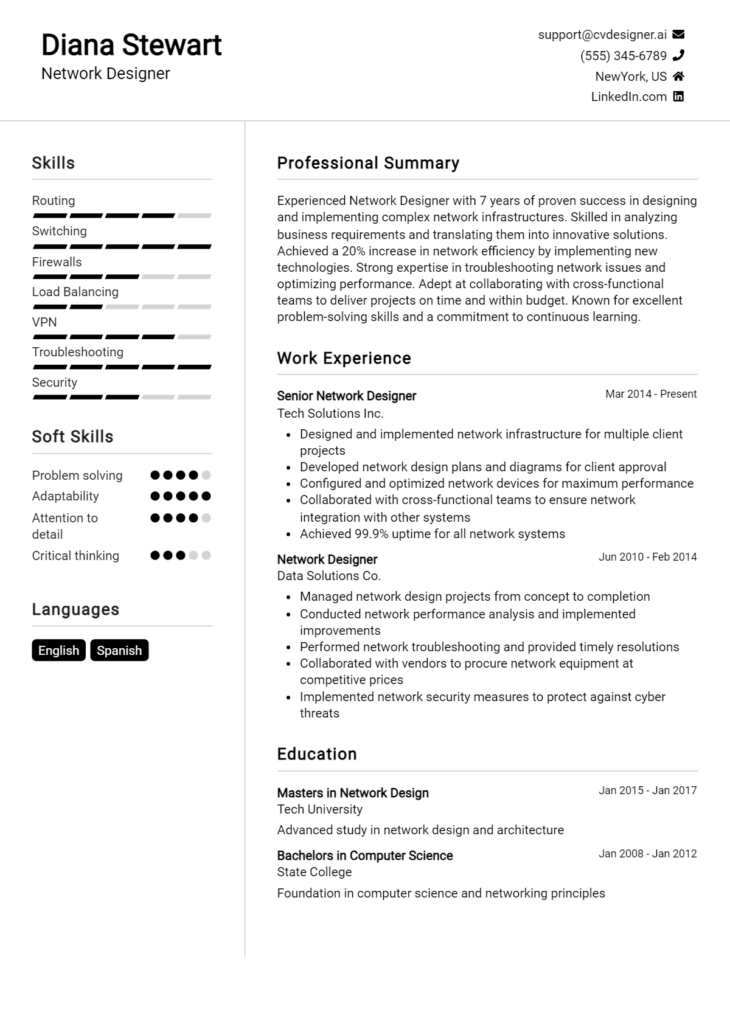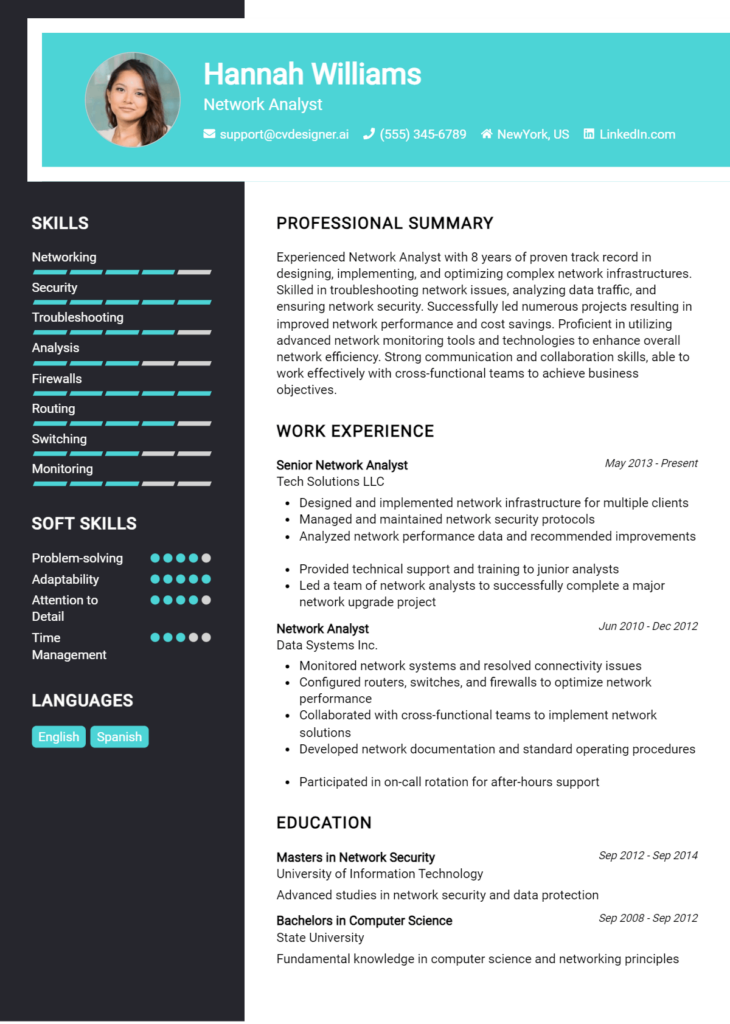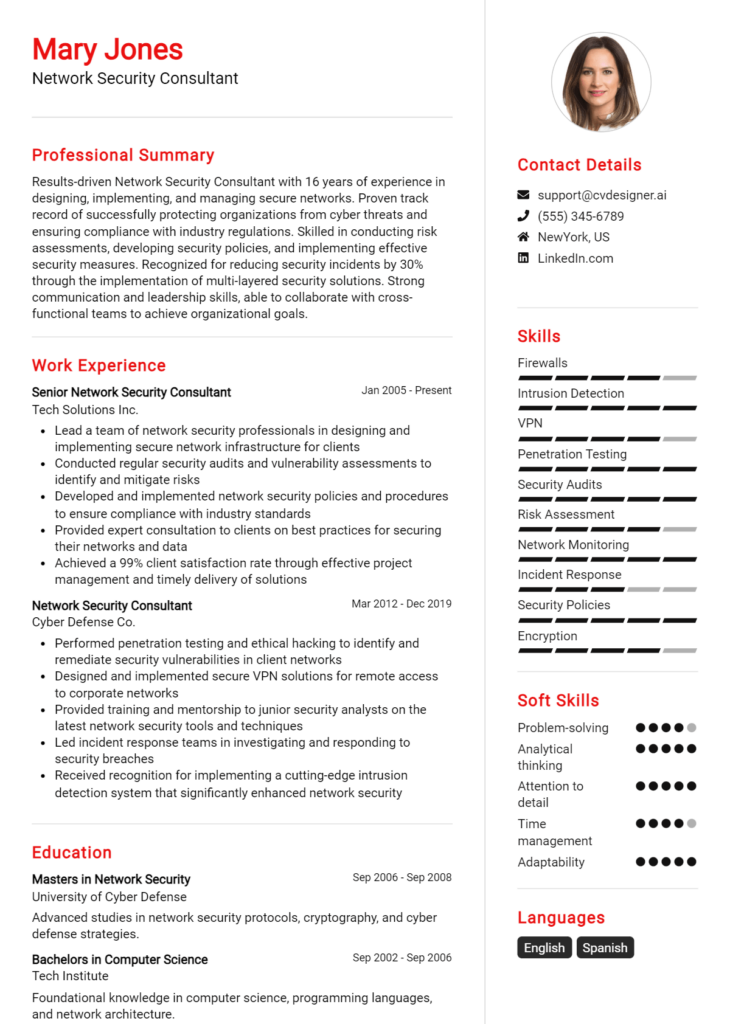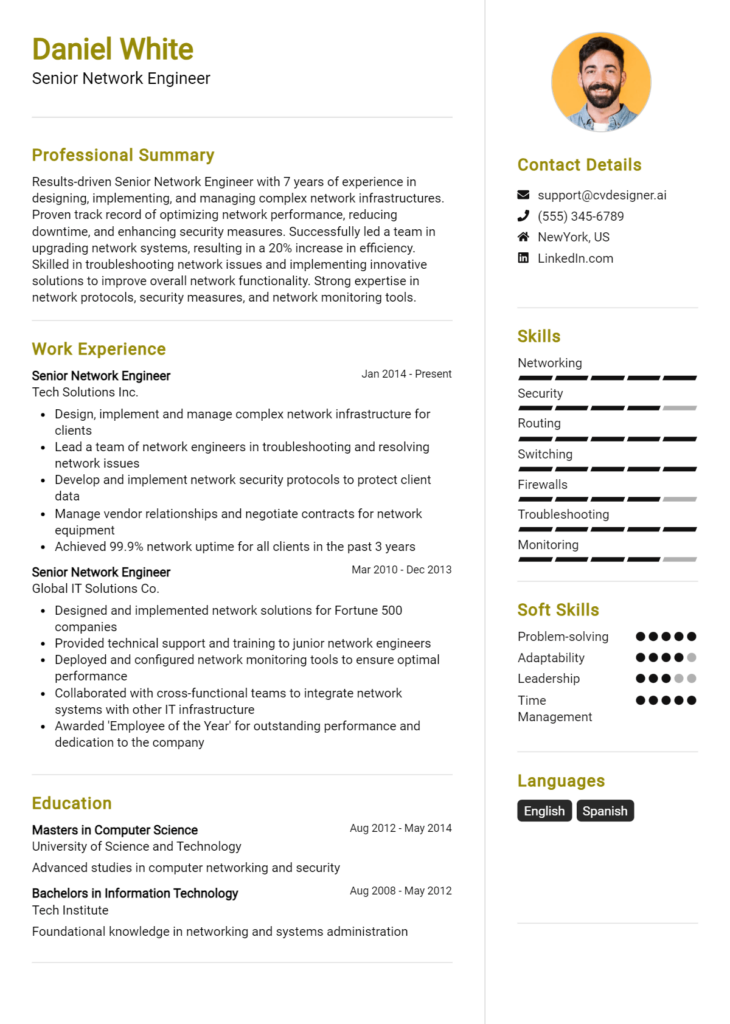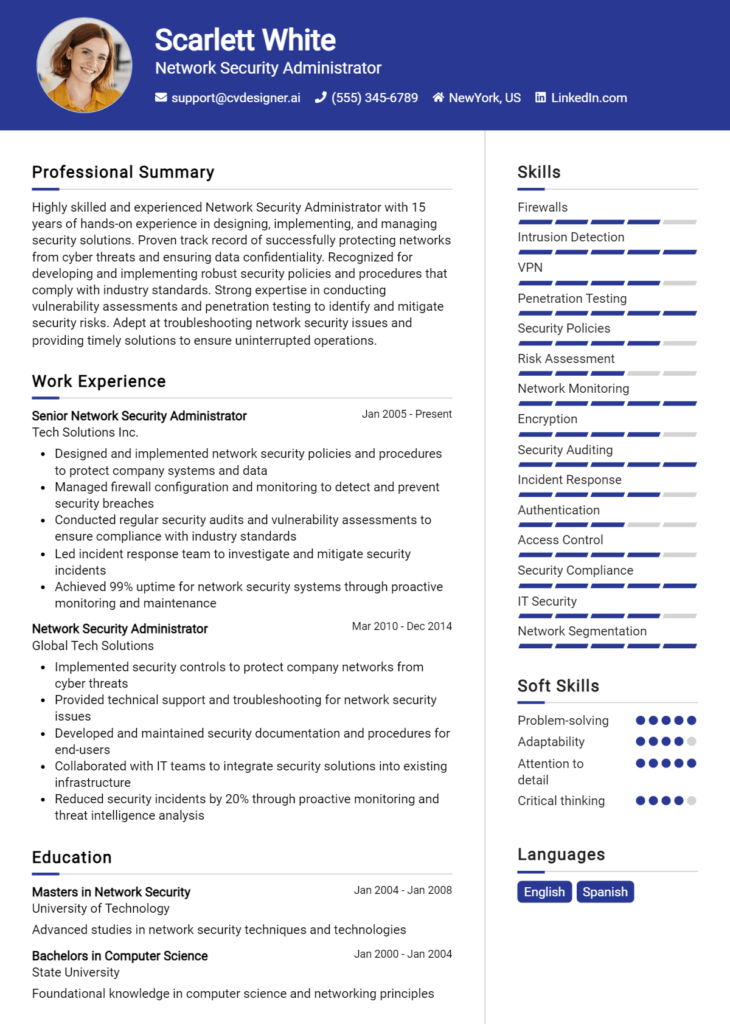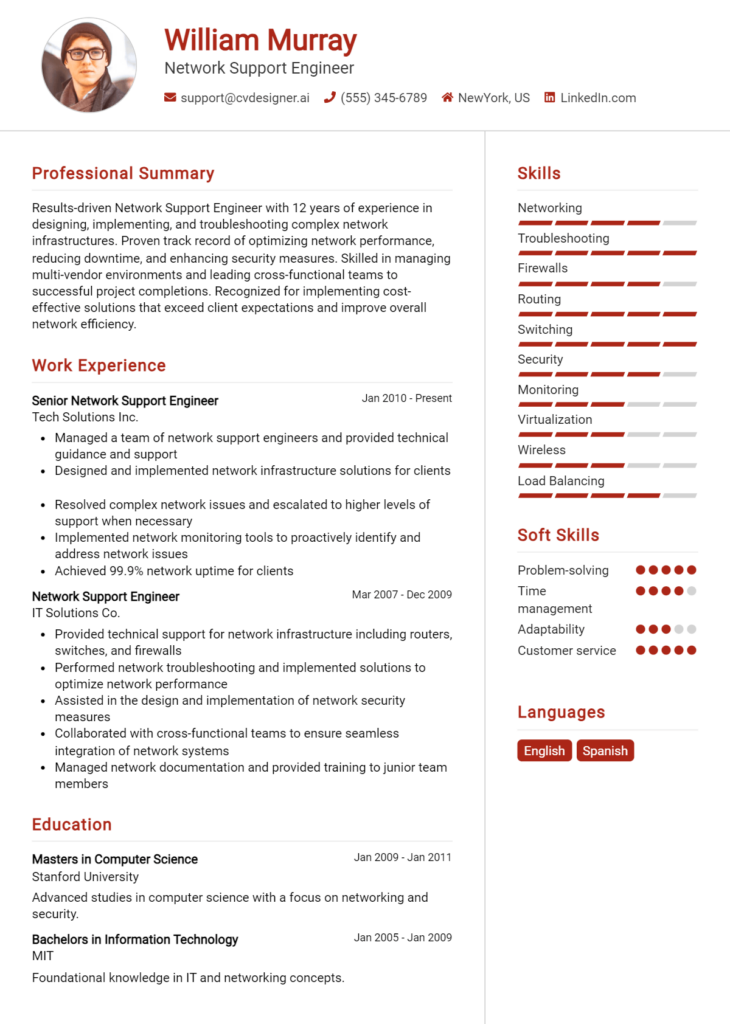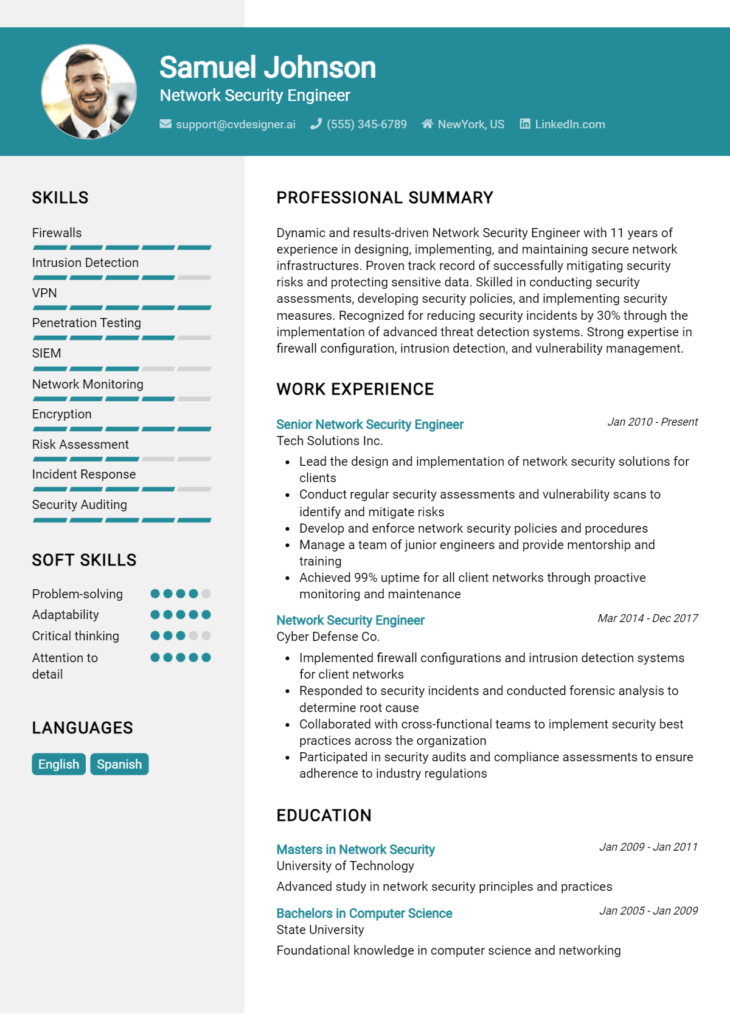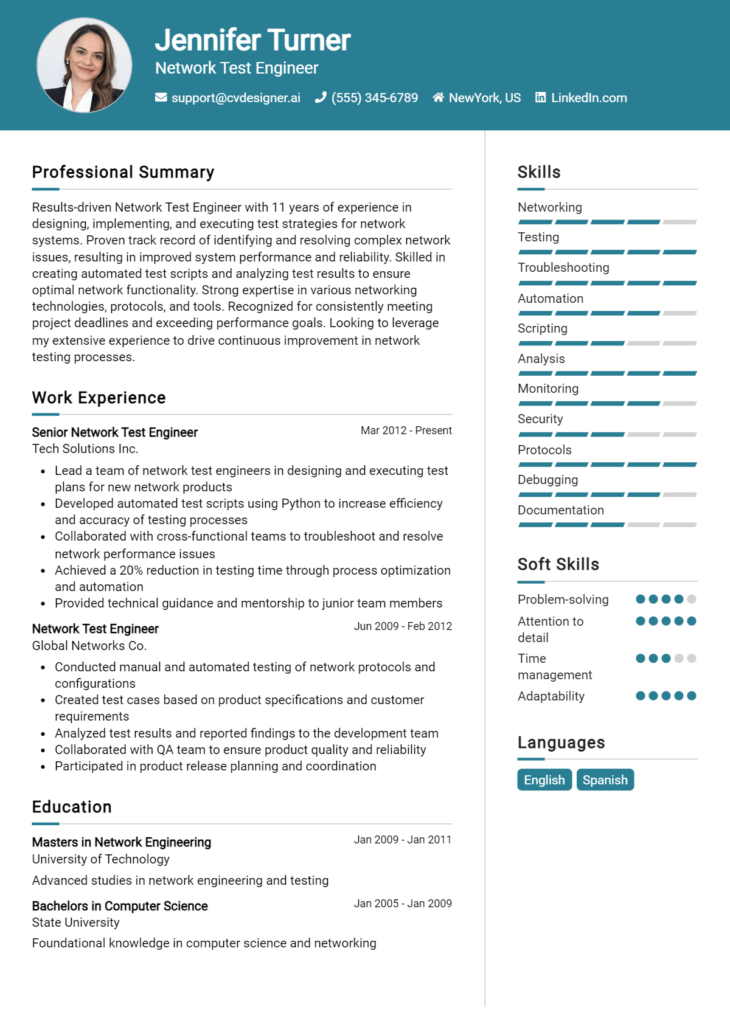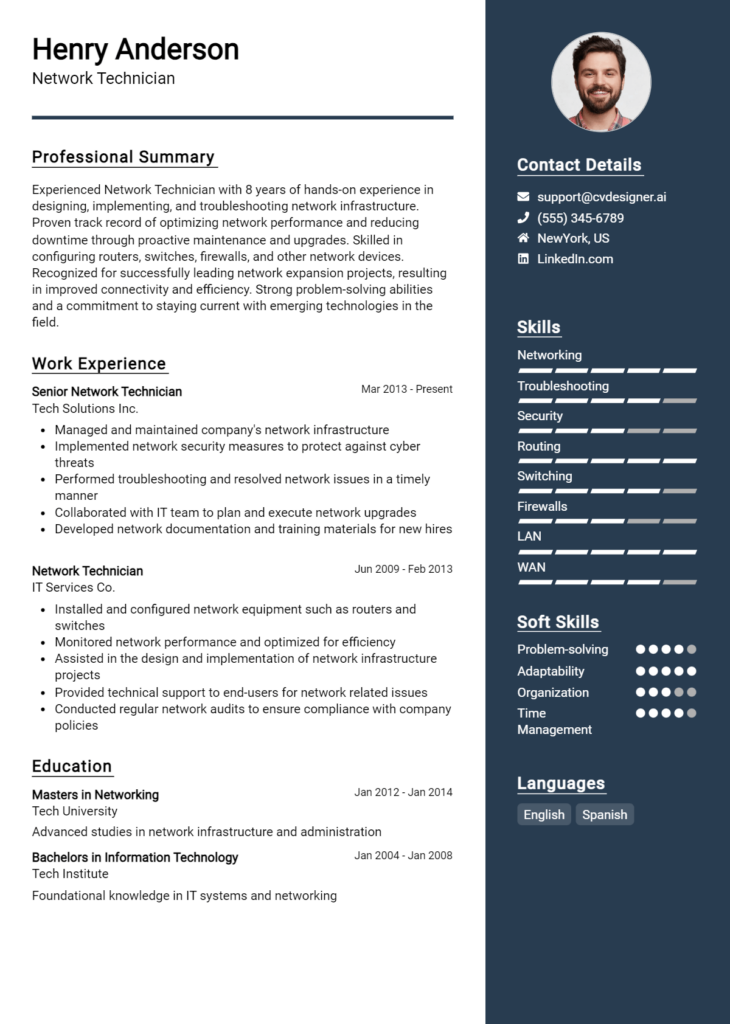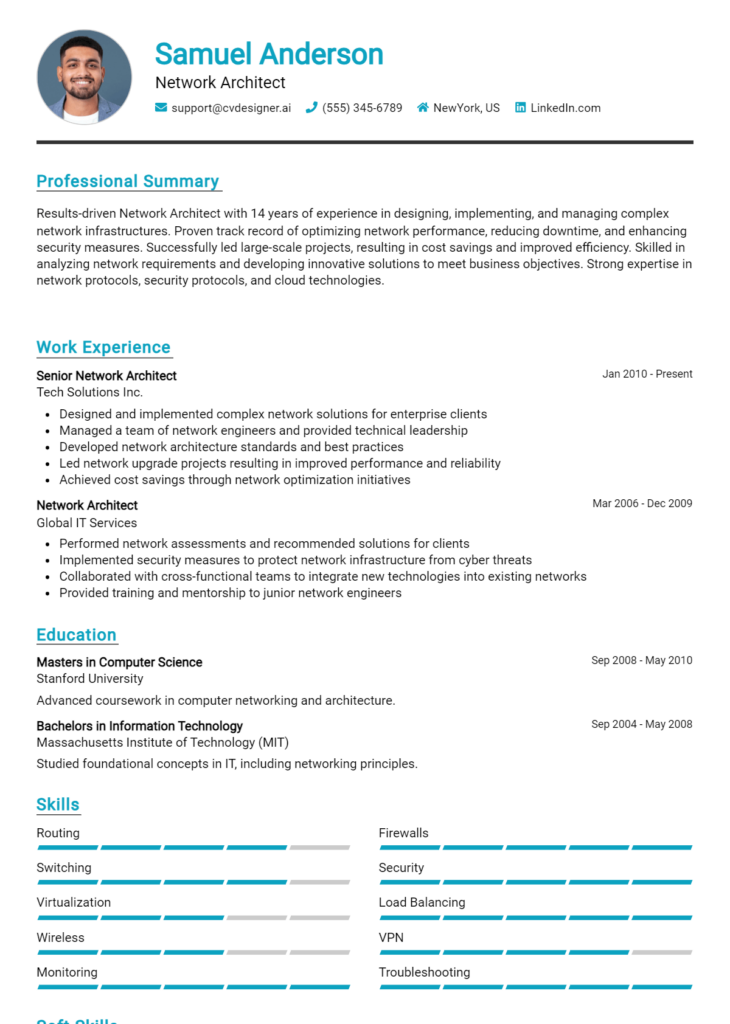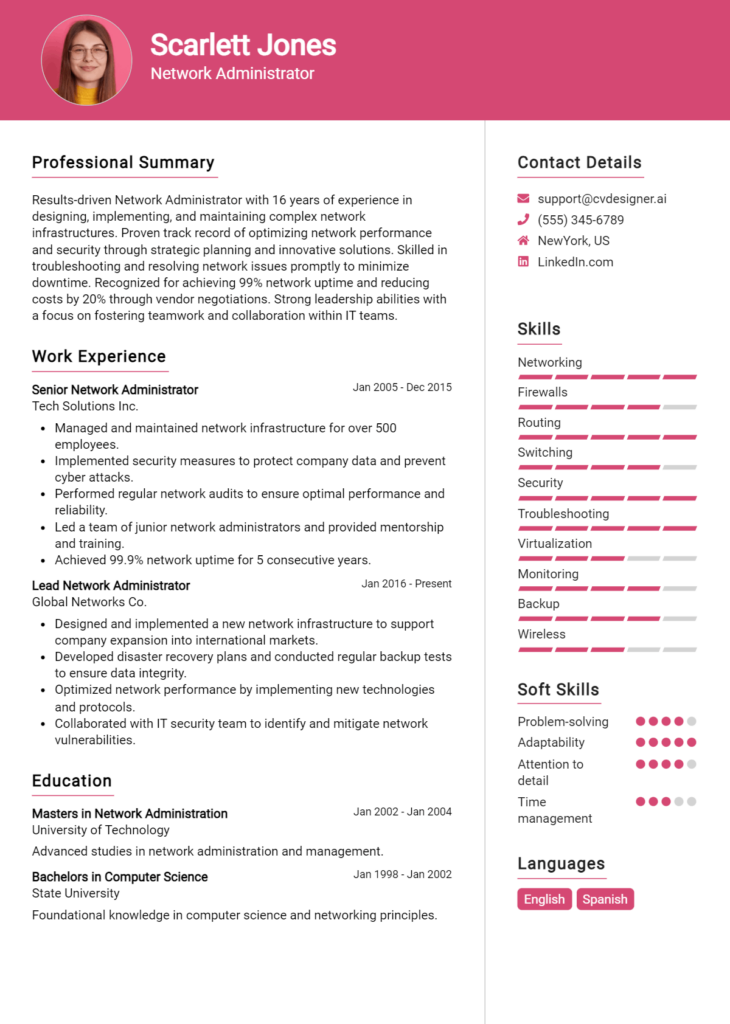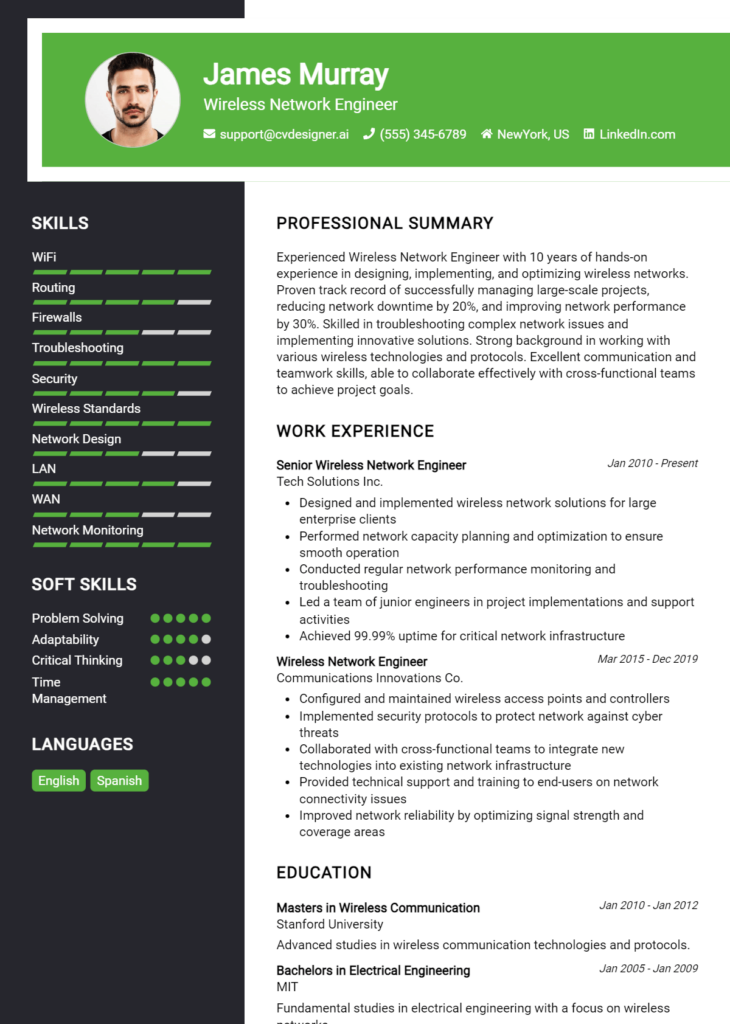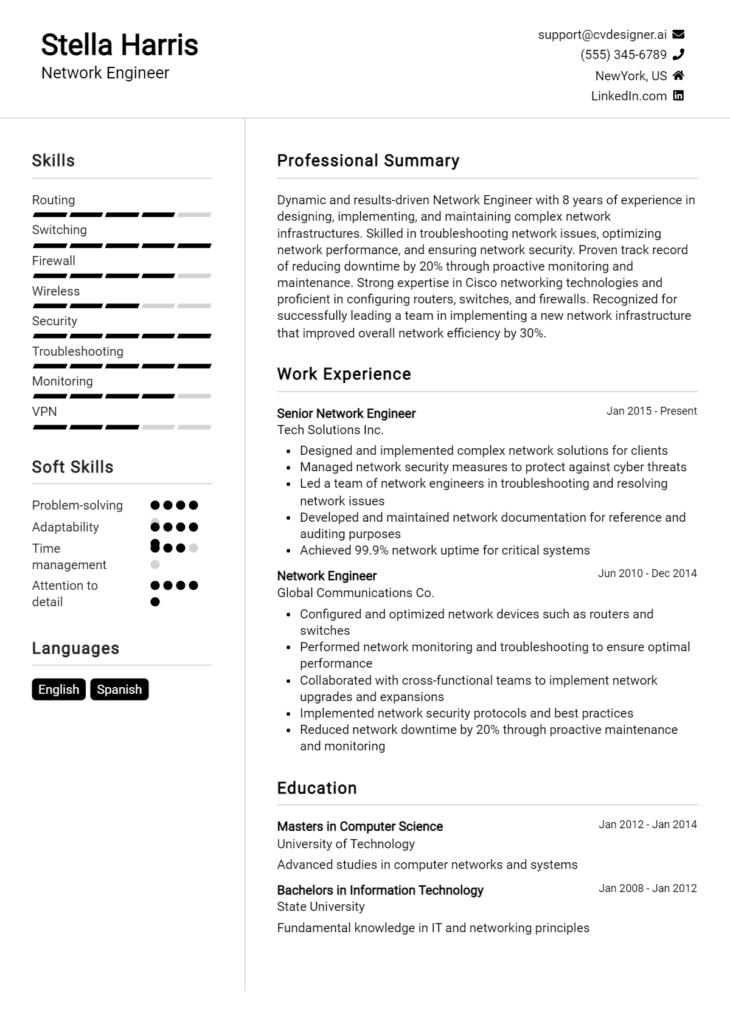Most Popular Network Operations Manager Resume Examples
Explore additional Network Operations Manager resume samples and guides and see what works for your level of experience or role.
As the backbone of an organization's IT infrastructure, the Network Operations Manager plays a crucial role in ensuring seamless connectivity, security, and performance across all network systems. This position demands a unique blend of technical expertise, strategic thinking, and leadership skills, making it a highly sought-after role in the tech industry. Crafting a compelling resume is essential for standing out in this competitive field, as it serves as your first impression to potential employers. A well-structured resume not only showcases your qualifications but also reflects your understanding of the industry's demands.
In this comprehensive guide to writing a Network Operations Manager resume, we'll delve into the key responsibilities and skills that hiring managers look for in candidates. You'll learn about the best formats to present your experience, along with common mistakes to avoid that could hinder your chances of landing an interview. We will also provide resume examples tailored for different experience levels, ensuring you find inspiration no matter where you are in your career. Additionally, you’ll receive practical tips on effective resume writing, as well as guidance on selecting the right resume templates to enhance your presentation. Whether you're a seasoned professional or just starting in the field, this guide will equip you with the tools needed to create a standout resume that opens doors to your next opportunity.
Key Responsibilities and Skills for a Network Operations Manager
As a Network Operations Manager, you play a critical role in overseeing the daily operations of an organization’s network infrastructure. Your responsibilities encompass ensuring network reliability, performance, and security, while also aligning with the organization's strategic goals. Key responsibilities include:
- Network Monitoring and Management: Continuously monitor network performance, identify issues, and implement solutions to minimize downtime.
- Team Leadership: Manage and mentor a team of network engineers and technicians, fostering a collaborative and high-performance work environment.
- Incident Response: Develop and execute incident response strategies to address network outages or security breaches promptly.
- Capacity Planning: Assess current network capacity and make recommendations for upgrades or expansions based on growth projections.
- Vendor Management: Collaborate with external vendors and service providers to ensure seamless integration and support of network services.
- Policy Development: Establish and enforce policies related to network security, data protection, and compliance with regulatory requirements.
- Documentation: Maintain accurate documentation of network configurations, changes, and procedures for reference and compliance.
To excel in this role, certain skills are essential:
- Strong analytical and problem-solving skills
- Proficiency in network protocols and technologies (e.g., TCP/IP, LAN/WAN, firewalls)
- Excellent leadership and team management abilities
- Experience with network monitoring tools and software
- Knowledge of cybersecurity principles and practices
- Effective communication skills, both verbal and written
- Project management expertise
Highlighting these skills effectively in the resume skills section is crucial for capturing the attention of potential employers. Tailoring your listed responsibilities and skills to match the job description can significantly enhance your chances of being noticed.
Consider how these skills could be relevant in creating a strong CV. By emphasizing your experience and expertise in these areas, you can present a compelling case for your candidacy, showcasing not only your qualifications but also your ability to contribute to the organization's success.
Best Resume Format and Structure for a Network Operations Manager
When crafting a resume for the position of Network Operations Manager, it's essential to choose a format that highlights your qualifications, experience, and skills in a clear and professional manner. Below is a detailed guide on the best resume format and structure, along with tips on what to include in each section.
Contact Information
- Start with your full name at the top, using a larger font size.
- Include your professional title (Network Operations Manager) directly below your name.
- List your phone number, email address, and LinkedIn profile (if applicable).
- Optional: Your physical address or city and state can be included, but ensure it doesn't clutter the design.
Professional Summary
- This section should be a brief overview of your career, ideally 3-4 sentences long.
- Focus on your years of experience, key achievements, and specific skills relevant to network operations.
- Tailor this summary to reflect your understanding of network management and operations, leadership skills, and your ability to drive results in a high-pressure environment.
Work Experience
- List your work experience in reverse chronological order, starting with your most recent position.
- For each role, include the job title, company name, location, and dates of employment.
- Use bullet points to outline your responsibilities and achievements, quantifying your impact wherever possible (e.g., “Reduced network downtime by 30% through proactive monitoring and maintenance”).
- Highlight any leadership roles or projects where you improved network efficiency or team performance.
Education
- Include your highest degree first, followed by the institution name, location, and graduation date.
- If you have relevant coursework or academic projects, consider listing them if they significantly contribute to your qualifications.
- If you have additional degrees or certifications, list them in reverse chronological order.
Skills
- Create a list of both technical and soft skills relevant to network operations management.
- Technical skills may include knowledge of network protocols, security, system architecture, and specific software or tools.
- Soft skills such as leadership, communication, problem-solving, and project management should also be highlighted.
- Use bullet points or a two-column format to keep this section organized and easy to read.
Certifications
- List any relevant certifications that enhance your qualifications, such as Cisco Certified Network Professional (CCNP), Certified Information Systems Security Professional (CISSP), or ITIL certification.
- Include the certifying body and the year obtained, as well as any ongoing education or training relevant to the position.
Formatting Tips
- Keep the resume to one page if you have less than 10 years of experience; two pages may be appropriate for more extensive backgrounds.
- Use a clean, professional font (e.g., Arial, Calibri, or Helvetica) and maintain consistent formatting throughout.
- Utilize headings and subheadings to create a structured layout that guides the reader.
- Incorporate white space strategically to enhance readability.
Complementary Cover Letter Format The resume format you choose should complement your cover letter format. Both documents should share similar styling elements, such as font type and size, color scheme, and header layout. This creates a cohesive look and reinforces your brand as a candidate. In your cover letter, you can expand on points from your resume, showcasing your personality and detailing how your experiences align with the specific needs of the employer. Be sure to address the hiring manager directly and express enthusiasm for the role, linking your qualifications to the company’s objectives.
By following this structured approach to your resume, you will present a professional image that clearly showcases your qualifications as a Network Operations Manager, making it easier for hiring managers to see your potential contributions to their organization.
Writing Tips and Best Practices for a Network Operations Manager Resume
When crafting a resume for a Network Operations Manager position, it's crucial to highlight your technical expertise and management skills in a clear and concise manner. Begin with a strong summary that showcases your experience and leadership qualities, and ensure each section of your resume is tailored to the job description. Utilize action verbs to convey your responsibilities and accomplishments effectively, making your contributions to previous roles stand out. Quantifying your achievements not only adds credibility but also demonstrates the impact you've had in your previous positions. Incorporate industry-specific keywords to align your resume with potential employer expectations, enhancing your chance of passing through Applicant Tracking Systems (ATS). For a polished appearance, consider using resume writing tips to structure your document. Don't forget that these best practices are equally important when drafting your cover letter, as they help present a consistent and professional image.
- Use action verbs like "managed," "designed," "optimized," and "implemented" to describe your experiences.
- Quantify achievements where possible; for example, "increased network uptime by 30%."
- Tailor your resume for each application, focusing on relevant skills and experiences that match the job description.
- Incorporate industry-specific keywords to enhance visibility in ATS scans.
- Highlight leadership and team management experiences to showcase your capability to lead a network operations team.
- Include certifications relevant to network management, such as CCNP or ITIL, to affirm your qualifications.
- Utilize bullet points for clarity and readability, making it easy for hiring managers to skim through.
- Keep the format clean and professional, ensuring consistent font sizes and spacing throughout the document.
Common Mistakes to Avoid in a Network Operations Manager Resume
Crafting a compelling resume for a Network Operations Manager position is crucial to stand out in a competitive job market. However, many candidates make common mistakes that can hinder their chances of landing an interview. By being aware of these pitfalls and taking the time to refine your resume, you can present your skills and experiences more effectively. Here are some of the most common mistakes to avoid when writing your resume:
- Overloading with information: Including excessive details can overwhelm hiring managers; focus on relevant experience.
- Using generic descriptions: Tailor your descriptions to reflect specific achievements and skills pertinent to the role.
- Neglecting quantifiable achievements: Failing to include metrics can make it harder to demonstrate your impact in previous roles.
- Ignoring formatting: A cluttered or inconsistent format can distract from your content; aim for clarity and professionalism.
- Not using action verbs: Passive language can weaken your statements; use strong action verbs to convey your contributions.
- Failing to customize for the job: Sending a generic resume can reduce your chances; customize your resume for each application.
- Overlooking keywords: Not incorporating relevant industry keywords can make your resume less likely to pass through Applicant Tracking Systems (ATS).
- Being too vague: Lack of specificity can leave hiring managers uncertain about your qualifications; provide clear examples of your work.
- Including irrelevant experience: Focus on experiences that align with the Network Operations Manager role, omitting unrelated jobs.
- Ignoring proofreading: Spelling and grammatical errors can create a negative impression; always proofread your resume before submission.
To further enhance your application, consider reviewing the common mistakes to avoid in a resume and ensure your cover letter is equally polished by avoiding the common cover letter mistakes. Taking these steps will greatly improve your chances of making a strong impression on potential employers.
Sample Network Operations Manager Resumes
As the demand for robust network infrastructures continues to grow, the role of a Network Operations Manager has become increasingly vital in organizations across various industries. This position requires a unique blend of technical expertise and leadership skills, making it essential for candidates to present themselves effectively through their resumes. Below are three sample resumes tailored to different experience levels: one for an experienced professional, one for an entry-level candidate, and one for a career changer. These examples showcase how to highlight relevant skills and experiences effectively.
Experienced Professional Resume
John Doe
[City, State]
[Phone Number]
[Email Address]
Professional Summary
Dynamic and results-driven Network Operations Manager with over 10 years of experience in leading network operations teams and managing large-scale network infrastructures. Proven track record in optimizing network performance, enhancing security protocols, and implementing innovative solutions to improve service delivery.
Professional Experience
Network Operations Manager
XYZ Corp, City, State
January 2015 – Present
- Lead a team of 15 network engineers in managing and maintaining a network infrastructure supporting over 10,000 users.
- Successfully reduced network downtime by 30% through proactive monitoring and incident management strategies.
- Developed and implemented comprehensive network security policies, resulting in a 40% decrease in security breaches.
Senior Network Engineer
ABC Inc., City, State
June 2010 – December 2014
- Managed network design and implementation for corporate offices, ensuring optimal performance and scalability.
- Collaborated with cross-functional teams to troubleshoot and resolve network issues, enhancing overall service quality.
- Conducted training sessions for junior engineers, improving team capabilities and efficiency.
Education
Bachelor of Science in Information Technology
University of Technology, City, State
Graduated: May 2010
Certifications
- Cisco Certified Network Professional (CCNP)
- Certified Information Systems Security Professional (CISSP)
Entry-Level Candidate Resume
Jane Smith
[City, State]
[Phone Number]
[Email Address]
Professional Summary
Enthusiastic and detail-oriented recent graduate with a degree in Computer Science, seeking an entry-level position as a Network Operations Manager. Strong foundational knowledge of networking concepts and hands-on experience with network configuration and troubleshooting during internships.
Education
Bachelor of Science in Computer Science
State University, City, State
Graduated: May 2023
Internship Experience
Network Intern
Tech Solutions, City, State
June 2022 – August 2022
- Assisted in monitoring and troubleshooting network systems, contributing to a 20% improvement in response times.
- Supported the implementation of network upgrades and maintained documentation for network configurations.
Projects
- Developed a network simulation project using Cisco Packet Tracer, demonstrating knowledge of routing and switching protocols.
- Collaborated on a team project to implement a secure Wi-Fi network for a local community center, enhancing internet access for residents.
Skills
- Proficient in TCP/IP, DNS, DHCP, and network security protocols
- Familiar with network monitoring tools such as Wireshark and SolarWinds
- Strong problem-solving and analytical abilities
Career Changer Resume
Michael Johnson
[City, State]
[Phone Number]
[Email Address]
Professional Summary
Results-oriented professional transitioning from a successful career in IT support to a Network Operations Manager role. Possess extensive experience in troubleshooting network issues and a strong desire to leverage technical skills and leadership qualities in a network management capacity.
Professional Experience
IT Support Specialist
Tech Innovations, City, State
March 2018 – Present
- Provided technical support for network-related issues, resulting in a 95% customer satisfaction rate.
- Conducted network performance assessments and collaborated with network engineers to implement improvements.
- Trained new team members on network troubleshooting techniques and customer service best practices.
Education
Bachelor of Arts in Business Administration
City College, City, State
Graduated: May 2017
Certifications
- CompTIA Network+
- Cisco Certified Network Associate (CCNA)
Skills
- Strong understanding of network infrastructure, protocols, and security
- Excellent communication and interpersonal skills
- Ability to lead cross-functional teams and manage projects effectively
For more resume examples and to refine your job application, feel free to explore additional resume examples. Additionally, consider reviewing corresponding cover letter examples to create a complete job application package that stands out to potential employers.
Checklist for a Network Operations Manager Resume
- Proofread for Errors: Carefully check for spelling, grammar, and punctuation mistakes. Consider reading the resume aloud to catch any awkward phrasing or overlooked errors.
- Consistency in Formatting: Ensure that font styles, sizes, and bullet point formats are consistent throughout the document. This includes headers, job titles, and dates.
- Tailor to Job Description: Review the job posting for the Network Operations Manager role and customize your resume to highlight relevant skills and experiences that match the requirements.
- Relevant Keywords: Incorporate industry-specific keywords from the job description to optimize your resume for Applicant Tracking Systems (ATS) and to catch the attention of hiring managers.
- Quantify Achievements: Use numbers and metrics to demonstrate your accomplishments (e.g., reduced downtime by 30%, managed a team of 10, etc.) to provide concrete evidence of your impact.
- Clear and Concise Language: Use clear and concise language to describe your experiences and skills. Avoid jargon that may not be understood by all readers.
- Professional Summary: Include a strong professional summary that encapsulates your experience, skills, and what you bring to the role of Network Operations Manager.
- Review Contact Information: Double-check that your contact information is current and prominently displayed at the top of your resume, including a professional email address and phone number.
- Check for Length: Ensure your resume is appropriately sized—ideally one to two pages—focusing on relevant experience and omitting outdated or less relevant information.
- Use an AI Resume Builder: Consider using an AI resume builder to ensure all elements are well-organized and professionally presented. A similar checklist can also be followed for creating a CV.
Key Takeaways for a Network Operations Manager Resume Guide
In conclusion, crafting a compelling resume as a Network Operations Manager is pivotal in showcasing your expertise and attracting the attention of potential employers. By following the examples and tips provided, you can create a strong resume that highlights your technical skills, leadership experience, and problem-solving abilities. To take your application to the next level, consider downloading a professionally designed template from resume templates or pairing your resume with a tailored cover letter using our cover letter templates. Additionally, for a more streamlined approach, you can utilize our intuitive resume maker to build a standout resume that reflects your unique qualifications. Start today and pave your way to your next career opportunity!
